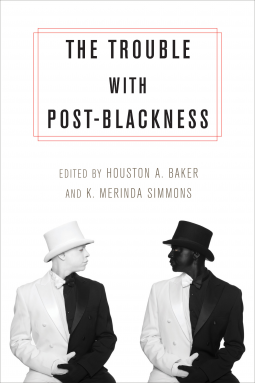
The Trouble with Post-Blackness
by Houston A. Baker and K. Merinda Simmons
This title was previously available on NetGalley and is now archived.
Send NetGalley books directly to your Kindle or Kindle app
1
To read on a Kindle or Kindle app, please add kindle@netgalley.com as an approved email address to receive files in your Amazon account. Click here for step-by-step instructions.
2
Also find your Kindle email address within your Amazon account, and enter it here.
Pub Date Feb 03 2015 | Archive Date Mar 17 2015
Description
An America in which the color of one's skin no longer matters would be unprecedented. With the election of President Barack Obama, that future suddenly seemed possible. Obama's rise reflects a nation of fluid populations and fortunes, a society in which a biracial individual could be embraced as a leader by all.Yet complicating this vision are the shifting demographics, rapid redefinitions of race, and instant invention of brands, trends, and identities that determine how we think about ourselves and the place of others.
This collection of original essays confronts the premise, advanced by black intellectuals, that the Obama administration marked the start of a "post-racial" era in the United States. While the "transcendent" and post-racial black elite declare victory over America's longstanding codes of racial exclusion and racist violence, their evidence relies largely on their own salaries and celebrity. These essays strike at the certainty of those who insist life, liberty, and the pursuit of happiness are now independent of skin color and race in America. They argue, signify, and testify that "post-blackness" is a problematic mythology masquerading as fact--a dangerous new "race science" motivated by black transcendentalist individualism. Through rigorous analysis, these essays expose the idea of a post-racial nation as a pleasurable entitlement for a black elite, enabling them to reject the ethics and urgency of improving the well-being of the black majority.
Houston A. Baker is a scholar of African-American literature and culture. He is a member of the pioneering generation of the 1960s that sought to expand the canons and definitions of the humanities in the academy. He served as director of Afro-American studies and founded and directed the Center for the Study of Black Literature and Culture at the University of Pennsylvania. His book Betrayal: How Black Intellectuals Have Abandoned the Ideals of the Civil Rights Era received an American Book Award.
K. Merinda Simmons is assistant professor of religious studies at the University of Alabama. She is coeditor, with Maha Marouan, of Race and Displacement: Nation, Migration, and Displacement in the Twenty-First Century. Her book, Changing the Subject: Writing Women Across the African Diaspora, is forthcoming from Ohio State University Press. Her areas of research and publication combine literary, religious, and Southern studies, with critical emphases on theories of gender and race.
Advance Praise
“An excellent collection; a timely intervention in a conversation with important ramifications for scholarship and civic life. There is both breadth and depth in these pieces, and a pleasing and engaging diversity of concerns and writing styles.”
—George Lipsitz, University of California Santa Barbara, author of The Possessive Investment in Whiteness
“The Trouble with Post-Blackness courageously puts to rest the dangerous and delusory attendant fabulous (as in fable) claim that we inhabit a post-racial America. Through these critically engaging essays the concept of “post-Blackness” is indeed troubled, rendered turbid and untenable in an America in which Black people continue to face ontological occlusion and existential foreclosure. This text refuses mythopoetic slogans and faddish signifiers, while ethically grounding us in the temporal now, and refusing to mock those Black bodies that face an anti-Black America that continues to mark them as dangerous, criminal, and existentially nugatory.”
—George Yancy, Duquesne University, author of Black Bodies, White Gazes: The Continuing Significance of Race
Available Editions
| EDITION | Hardcover |
| ISBN | 9780231169349 |
| PRICE | $30.00 (USD) |








